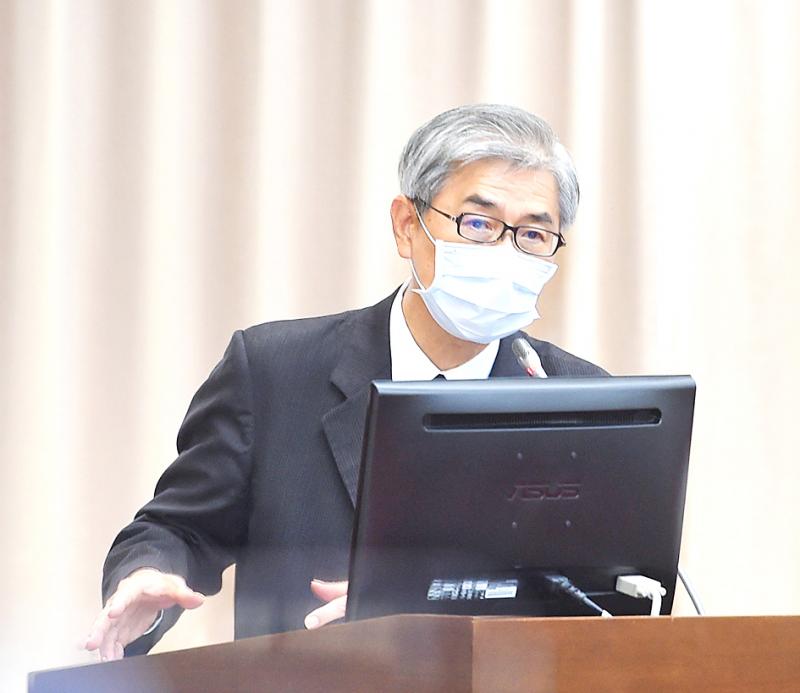The Financial Supervisory Commission (FSC) has denied companies the option of merging with special-purpose acquisition companies (SPACs) to list on the local stock market, commission Chairman Thomas Huang (黃天牧) told a meeting of the legislature’s Finance Committee on Tuesday.
The commission made its stance firm, even though Gogoro Inc (睿能創意) earlier this month announced plans to launch an initial public offering (IPO) on the NASDAQ via a merger with US-based Poema Global Holdings Corp.
The listing mechanism involving SPACs might not fit the local stock market, in which individual investors account for about 70 percent of all investors, while the majority of investors in the US stock market are institutional investors, who can take higher risks, Huang said

Photo: Fang Pin-chao, Taipei Times
Even the US Securities and Exchange Commission (SEC) has concerns about SPACs, he said.
Regulations in the US allow a SPAC to go public without any actual business or revenue, and a SPAC only exists to acquire a target company within two years, offering a way for a private company to go public and bypass the time and expense of an IPO, Securities and Futures Bureau Deputy Director Kuo Chia-chun (郭佳君) said.
This practice is in conflict with practices in Taiwan, as even by the loosest listing rules, the Taiwan Stock Exchange and Taipei Exchange must review financial reports of the companies seeking to go public, but a SPAC cannot produce financial reports as it does not have real operations, Kuo said.
The SEC is researching how to enhance protection for investors, after a SPAC exaggerated the profit potential of its target company, and until the US regulator has more comprehensive guidance or measures to protect investors, the FSC would not consider introducing the SPAC mechanism to the local market, Kuo said.
Singapore earlier this month unveiled its SPAC listing framework, making it the only Asian country that allows SPAC listings, and the FSC would also observe how Singapore fares, she said.

ADVANCED: Previously, Taiwanese chip companies were restricted from building overseas fabs with technology less than two generations behind domestic factories Taiwan Semiconductor Manufacturing Co (TSMC, 台積電), a major chip supplier to Nvidia Corp, would no longer be restricted from investing in next-generation 2-nanometer chip production in the US, the Ministry of Economic Affairs said yesterday. However, the ministry added that the world’s biggest contract chipmaker would not be making any reckless decisions, given the weight of its up to US$30 billion investment. To safeguard Taiwan’s chip technology advantages, the government has barred local chipmakers from making chips using more advanced technologies at their overseas factories, in China particularly. Chipmakers were previously only allowed to produce chips using less advanced technologies, specifically

BRAVE NEW WORLD: Nvidia believes that AI would fuel a new industrial revolution and would ‘do whatever we can’ to guide US AI policy, CEO Jensen Huang said Nvidia Corp cofounder and chief executive officer Jensen Huang (黃仁勳) on Tuesday said he is ready to meet US president-elect Donald Trump and offer his help to the incoming administration. “I’d be delighted to go see him and congratulate him, and do whatever we can to make this administration succeed,” Huang said in an interview with Bloomberg Television, adding that he has not been invited to visit Trump’s home base at Mar-a-Lago in Florida yet. As head of the world’s most valuable chipmaker, Huang has an opportunity to help steer the administration’s artificial intelligence (AI) policy at a moment of rapid change.

The New Taiwan dollar is on the verge of overtaking the yuan as Asia’s best carry-trade target given its lower risk of interest-rate and currency volatility. A strategy of borrowing the New Taiwan dollar to invest in higher-yielding alternatives has generated the second-highest return over the past month among Asian currencies behind the yuan, based on the Sharpe ratio that measures risk-adjusted relative returns. The New Taiwan dollar may soon replace its Chinese peer as the region’s favored carry trade tool, analysts say, citing Beijing’s efforts to support the yuan that can create wild swings in borrowing costs. In contrast,

TARIFF SURGE: The strong performance could be attributed to the growing artificial intelligence device market and mass orders ahead of potential US tariffs, analysts said The combined revenue of companies listed on the Taiwan Stock Exchange and the Taipei Exchange for the whole of last year totaled NT$44.66 trillion (US$1.35 trillion), up 12.8 percent year-on-year and hit a record high, data compiled by investment consulting firm CMoney showed on Saturday. The result came after listed firms reported a 23.92 percent annual increase in combined revenue for last month at NT$4.1 trillion, the second-highest for the month of December on record, and posted a 15.63 percent rise in combined revenue for the December quarter at NT$12.25 billion, the highest quarterly figure ever, the data showed. Analysts attributed the